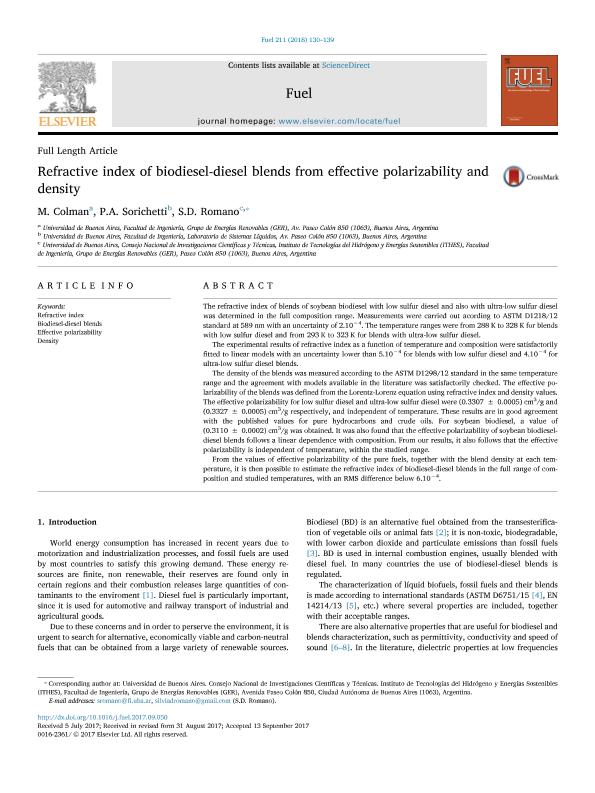Mostrar el registro sencillo del ítem
dc.contributor.author
Colman, M.
dc.contributor.author
Sorichetti, Patricio Aníbal

dc.contributor.author
Romano, Silvia Daniela

dc.date.available
2020-02-17T22:51:11Z
dc.date.issued
2018-01
dc.identifier.citation
Colman, M.; Sorichetti, Patricio Aníbal; Romano, Silvia Daniela; Refractive index of biodiesel-diesel blends from effective polarizability and density; Elsevier; Fuel; 211; 1-2018; 130-139
dc.identifier.issn
0016-2361
dc.identifier.uri
http://hdl.handle.net/11336/97866
dc.description.abstract
The refractive index of blends of soybean biodiesel with low sulfur diesel and also with ultra-low sulfur diesel was determined in the full composition range. Measurements were carried out acording to ASTM D1218/12 standard at 589 nm with an uncertainty of 2.10−4. The temperature ranges were from 288 K to 328 K for blends with low sulfur diesel and from 293 K to 323 K for blends with ultra-low sulfur diesel. The experimental results of refractive index as a function of temperature and composition were satisfactorily fitted to linear models with an uncertainty lower than 5.10−4 for blends with low sulfur diesel and 4.10−4 for ultra-low sulfur diesel blends. The density of the blends was measured according to the ASTM D1298/12 standard in the same temperature range and the agreement with models available in the literature was satisfactorily checked. The effective polarizability of the blends was defined from the Lorentz-Lorenz equation using refractive index and density values. The effective polarizability for low sulfur diesel and ultra-low sulfur diesel were (0.3307 ± 0.0005) cm3/g and (0.3327 ± 0.0005) cm3/g respectively, and independent of temperature. These results are in good agreement with the published values for pure hydrocarbons and crude oils. For soybean biodiesel, a value of (0.3110 ± 0.0002) cm3/g was obtained. It was also found that the effective polarizability of soybean biodiesel-diesel blends follows a linear dependence with composition. From our results, it also follows that the effective polarizability is independent of temperature, within the studied range. From the values of effective polarizability of the pure fuels, together with the blend density at each temperature, it is then possible to estimate the refractive index of biodiesel-diesel blends in the full range of composition and studied temperatures, with an RMS difference below 6.10−4.
dc.format
application/pdf
dc.language.iso
eng
dc.publisher
Elsevier

dc.rights
info:eu-repo/semantics/openAccess
dc.rights.uri
https://creativecommons.org/licenses/by-nc-nd/2.5/ar/
dc.subject
BIODIESEL-DIESEL BLENDS
dc.subject
DENSITY
dc.subject
EFFECTIVE POLARIZABILITY
dc.subject
REFRACTIVE INDEX
dc.subject.classification
Ingeniería de Procesos Químicos

dc.subject.classification
Ingeniería Química

dc.subject.classification
INGENIERÍAS Y TECNOLOGÍAS

dc.title
Refractive index of biodiesel-diesel blends from effective polarizability and density
dc.type
info:eu-repo/semantics/article
dc.type
info:ar-repo/semantics/artículo
dc.type
info:eu-repo/semantics/publishedVersion
dc.date.updated
2019-10-18T15:46:12Z
dc.journal.volume
211
dc.journal.pagination
130-139
dc.journal.pais
Países Bajos

dc.journal.ciudad
Amsterdam
dc.description.fil
Fil: Colman, M.. Universidad de Buenos Aires. Facultad de Ingeniería. Departamento de Ingeniería Mecánica; Argentina
dc.description.fil
Fil: Sorichetti, Patricio Aníbal. Consejo Nacional de Investigaciones Científicas y Técnicas; Argentina. Universidad de Buenos Aires. Facultad de Ingeniería. Departamento de Física; Argentina
dc.description.fil
Fil: Romano, Silvia Daniela. Consejo Nacional de Investigaciones Científicas y Técnicas. Oficina de Coordinación Administrativa Ciudad Universitaria. Instituto de Tecnologías del Hidrogeno y Energias Sostenibles. Universidad de Buenos Aires. Facultad de Ingeniería. Instituto de Tecnologías del Hidrogeno y Energias Sostenibles; Argentina
dc.journal.title
Fuel

dc.relation.alternativeid
info:eu-repo/semantics/altIdentifier/doi/http://dx.doi.org/10.1016/j.fuel.2017.09.050
dc.relation.alternativeid
info:eu-repo/semantics/altIdentifier/url/https://www.sciencedirect.com/science/article/pii/S0016236117311602
Archivos asociados
